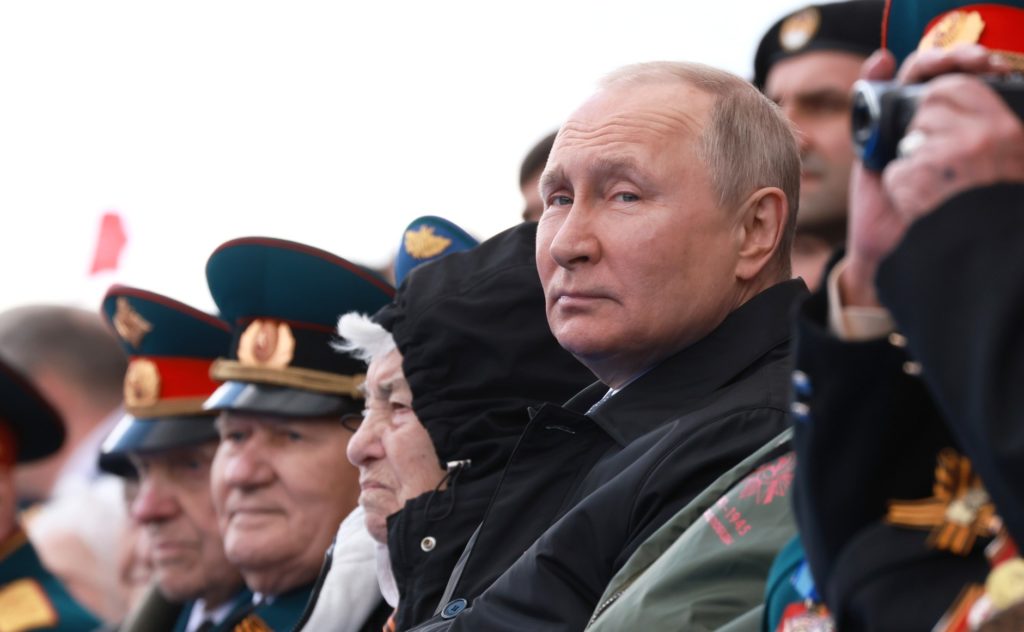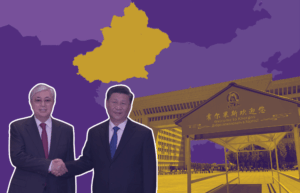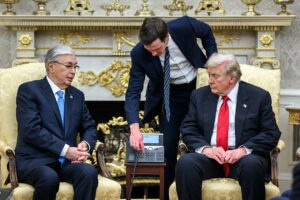Russian president Vladimir Putin has invited his counterparts from Kyrgyzstan, Tajikistan, Turkmenistan, Kazakhstan, and Uzbekistan to attend the annual Victory Day celebrations in Moscow on May 9. The occasion marks the first time the Central Asian presidents will meet Putin after the latter’s indictment by the International Criminal Court.
On April 25, the office of the Kyrgyz president issued a press release stating that Kyrgyzstan’s Sadyr Japarov would attend the annual military parade on Red Square on May 9 as a “guest of honour”. Several days later, on May 5, Putin also invited Tajikistan’s Emomali Rahmon to Moscow.
The day before the parade, on May 8, a rapid fire of invitations sent the presidents of Turkmenistan, Kazakhstan and Uzbekistan all flying to Russia. It will be the first time in years that all five Central Asian presidents will take part in the Victory Day celebrations.
Since the start of Russia’s invasion of Ukraine, the Kremlin has paid significantly more attention to Central Asia. In 2022 alone, Putin visited all five countries in the region – something that had not happened in a long time. While the Russian president is increasingly cornered internationally, Moscow clearly holds on tight to its few remaining allies.
Yet, this will be the first time for Central Asian leaders that they share the stage with the Russian president after he was charged with war crimes.
A wanted man
Recently, the International Criminal Court (ICC) issued an arrest warrant for the Russian president on allegations relating to the illegal deportation of Ukrainian children from occupied areas to Russia.
Last week, South African authorities warned that Putin risks being arrested during the upcoming BRICS summit in August, should the Russian president decide to make an appearance. South Africa has ratified the founding treaty of the ICC and hence obligated to act should Putin set foot in the country.
In Central Asia, Tajikistan is the only state party to the treaty and thus – in theory – bound to cooperate with the Court. Kyrgyzstan and Uzbekistan both signed the treaty some twenty years ago, but have so far failed to ratify it. By contrast, Kazakhstan and Turkmenistan are non-signatory states. Hence, should the Russian president decide to visit the region, as he did so often last year, chances of Central Asian authorities refusing Putin entry because of the arrest warrant are slim.
An offer one can’t refuse
In many ways, Central Asia still is highly dependent on Russia. According to political analyst Arkady Dubnov, who was interviewed by Kyrgyz news outlet Kloop about the Kremlin’s invitation to Japarov, Bishkek had no choice but to accept.
Kyrgyzstan still has deep economic ties with Russia. Although China is making significant inroads in Central Asia as part of its Belt and Road Initiative, Russia remains incredibly important in terms of trade and remittances.
Read more on Novastan: Effects of sanctions on Russia strongly felt in Dushanbe
The most recent data from the World Bank show that over 30 percent of Kyrgyz GDP consists of remittances. 97 percent of these remittances are sent by Kyrgyz migrants working in Russia. Hence, it is safe to say that economic ties with Russia are highly asymmetrical and Moscow is well aware of this.
In the case of Tajikistan, economic dependence on Russia is just as significant. As Tajik news media Asia Plus reported that last year, remittances from Russia reached a record high. Russian authorities also registered a post-pandemic spike in migrant inflow. In 2022, nearly one million people from Tajikistan travelled to Russia for work.
Central Asia as a sanctions loophole
The war in Ukraine, however, has somewhat tilted the balance in favour of Central Asian economies. Countries such as Kazakhstan and Kyrgyzstan have transformed into important hubs for reexporting goods to Russia.
Radio Azattyk, the Kyrgyz service of Radio Liberty that was recently forced to shut down, interviewed Temir Shabdanaliev, head of a Kyrgyz lobbying group, about this trend. He explained: “If goods from Europe were previously sent to Russia, now they are registered as deliveries to Kyrgyzstan and Kazakhstan. But as soon as they are unloaded here, they are immediately taken to Russia.“
As a result, trade to and from Central Asia has boomed since the start of western sanctions. In Kyrgyzstan, there has been a remarkable uptick in trade of “shampoo, toothpicks, soap, and car parts”, according to RFE/RL.
Read more on Novastan: Turkey continues exporting drones to Central Asia
Relevant authorities in Tajikistan also signalled an increase in trade with Russia. Last year Tajik authorities were even accused of supplying Moscow with Iranian-designed drones for its war in Ukraine. These accusations were based on a recent deal Dushanbe signed with Tehran to produce drones under license in Tajikistan. However, US-based magazine The Diplomat found no visual evidence to support claims that Tajik-manufactured drones were roaming Ukrainian skies.
Risky business
But there is a certain risk in reexporting goods to Russia. The EU has warned the Central Asian republics that it could impose secondary sanctions on businesses helping Russia dodge sanctions.
For countries like Kyrgyzstan and Tajikistan, there is little room for manoeuvre. Economic dependence on Russia often outweighs western pressure. However, the invasion of Ukraine has made many in Central Asia aware of existing neo-colonial power relations.
Several weeks ago, Eurasianet reported about a Russian ban on the import of Kyrgyz dairy products after Bishkek moved to adopt a law to promote the Kyrgyz language. The Kremlin sees this development as an attempt to curb its cultural influence in Central Asia.
Patronage to Putin
May 9 is yet another important reminder of the region’s colonial past. That is why over the past decades, most Central Asian countries have gradually said goodbye to Soviet-imposed Victory Day.
In Kazakhstan, military parades have been scrapped “to maintain the required level of combat readiness”, press agency Kazinform reported. In Turkmenistan, May 9 has not been a public holiday since 2018. Victory Day in Uzbekistan has been transformed into a ‘Day of Remembrance and Honour,’ emphasizing commemoration over military pomp.
Read more on Novastan: Kazakhstan: commemorating Victory Day without military parade
Although Victory Day in Kyrgyzstan and Tajikistan still bears significant resemblance to the Soviet era, times are changing there as well. In many places, celebrations are scaled down or rescheduled to both countries’ respective independence days. Owing to Russia’s invasion of Ukraine, this process will likely accelerate.
Yet, nation-building and symbolism remain subject to real-world constraints. As long as economic dependence continues, regional leaders have no option but to pay patronage to where the money comes from: Putin’s Russia.
Correction: in an earlier version of this article it was stated that Uzbekistan and Kyrgyzstan are parties to the ICC. Although the two countries have signed the founding treaty of the ICC, both have failed to ratify it as of yet. Hence, neither Tashkent nor Bishkek is legally obligated to cooperate with the Court.
For more news and analysis from Central Asia, follow us on Twitter, Facebook, Telegram, Linkedin or Instagram.
Written by Julian Postulart
 Central Asian presidents invited to attend Russian Victory Day Parade
Central Asian presidents invited to attend Russian Victory Day Parade 



